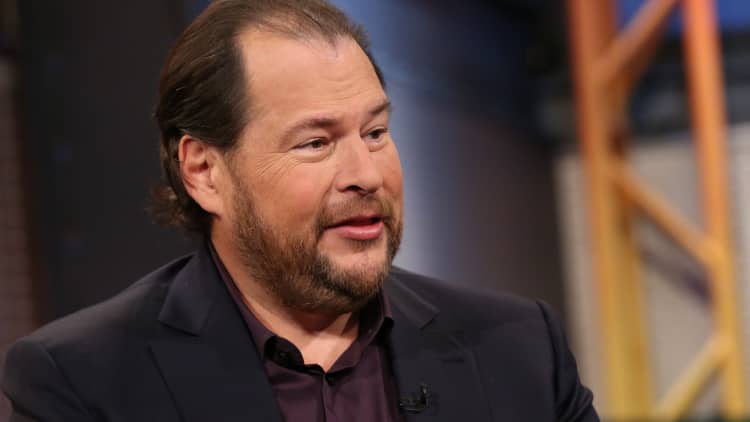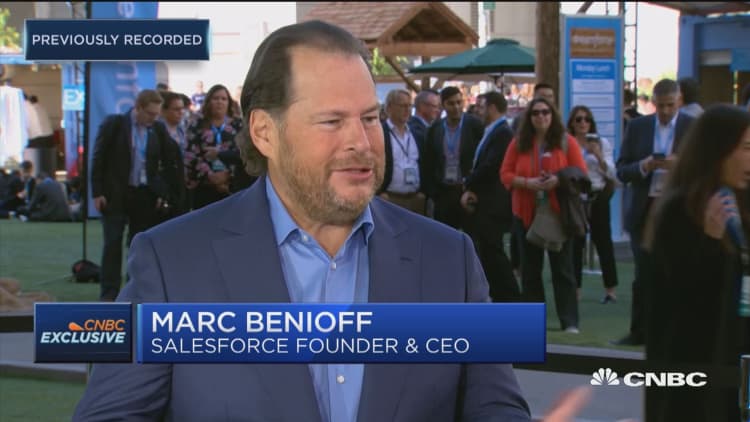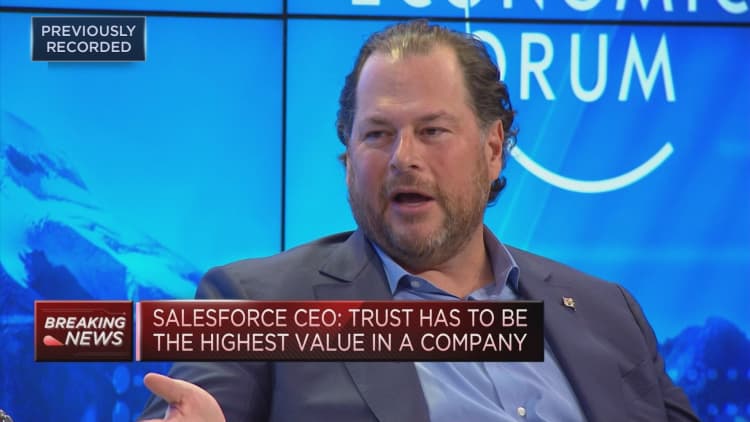Two years ago Salesforce introduced a mobile app and communications service to help field workers like elevator mechanics and cable repair technicians manage their schedules and track their jobs.
That product — Field Service Lightning (FSL) — has gained such rapid adoption that it's on pace to become Salesforce's fastest-growing offering through its first three years, according to people familiar with the matter.
FSL booked $14 million in new contracts in 2016 and $56 million last year, said the sources, who asked not to be named because those figures are confidential. At this pace, FSL is expected to easily surpass $100 million in annual revenue this year, one of the people said.

FSL doesn't get the level of publicity of other recent products like Wave Analytics and IoT Cloud but underscores Salesforce's ability to cross-sell new services to its massive customer base and quickly carve out new market opportunities. It's also the kind of breakthrough Salesforce needs to achieve CEO Marc Benioff's goal of growing from a revenue run rate of $10 billion in 2017 to $20 billion by 2022.
FSL, which competes with GE's ServiceMax, Oracle, and Microsoft, was launched as part of Salesforce's strategy to target specific industries like health care, telecommunications and industrials, which are increasingly turning to cloud field service apps.
"Those numbers are tremendous," said Tom Roderick, an analyst at Stifel Nicolaus, in reference to FSL's growth. "Salesforce seems to have really hit its stride with both the cross-sale approach back to the installed base and with the vertically-specific sales approach to targeted industries," said Roderick, who recommends buying Salesforce shares.
It took Salesforce as a whole six years to surpass $100 million in revenue, a mark that it hit in 2005. Among other cloud software vendors, Box took nine years to reach $100 million in sales, while it took Zendesk seven years to reach the milestone.
For Salesforce, FSL is still a tiny part of the overall business. But its quick expansion is already drawing the attention of market analysts.

In its 2017 Magic Quadrant report for field service management software, Gartner included Salesforce for the first time. Although the report put Salesforce behind competitors like ServiceMax and Oracle, it noted that FSL has grown "faster than any new product in the company's history," with an estimated active user base of 15,000 to 20,000 as of June 2017.
A Salesforce representative declined to comment.
Growing leadership turnover
Even with its success, FSL and the Service Cloud division that it's a part of have been dealing with leadership turnover in recent years.
As CNBC reported in August, Service Cloud appointed its fourth group leader in four years in 2017. Michael Chou, who had been FSL's product lead, left the company early this year, as did Jon Aniano, the product lead for Service Cloud.
In the company's last earnings call, Benioff said that it's natural for leadership teams to experience change when the product reaches a certain scale. But he also pointed to Service Cloud's continued growth, which had $2.3 billion in annual sales last year.
"As [Service Cloud] has grown so fast, you've seen an acceleration of that management team and growth of that management team," Benioff said.
FSL still needs to prove it is ready for the enterprise. For example, the group recently nabbed elevator manufacturer Kone from ServiceMax as its largest customer but is still working through some product challenges before full deployment, according to a source with knowledge of the matter. The Gartner report said that most of FSL's live customers are small or midsized organizations.
A ServiceMax representative didn't respond to a request for comment.
Salesforce executives have been talking up FSL's potential and are likely to offer commentary on its momentum when the company reports fourth-quarter earnings on Wednesday. Salesforce Chief Operating Officer Keith Block had this to say about FSL at a Wells Fargo event in December:
"[Field Service] is a relatively new product that again, we released last year that has got an incredible uptick."
WATCH: Salesforce CEO on regulation and innovation



